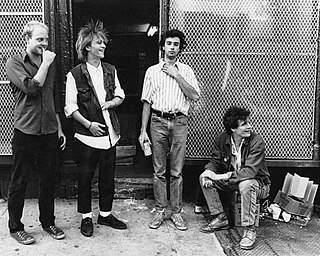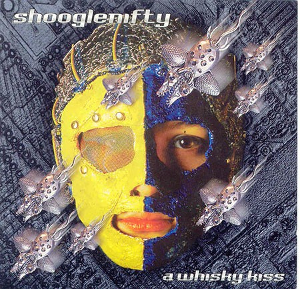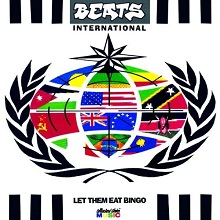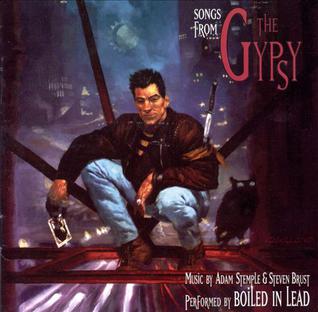
Talking Heads were an American rock band that began performing under that name in 1975 in New York City. The band was composed of David Byrne, Chris Frantz (drums), Tina Weymouth (bass) and Jerry Harrison. Described as "one of the most critically acclaimed groups of the '80s," Talking Heads helped to pioneer new wave music by combining elements of punk, art rock, funk, and world music with "an anxious yet clean-cut image"; they have been called "a properly postmodernist band."

The Replacements were an American rock band formed in Minneapolis, Minnesota, in 1979. Initially a punk band, they are one of the main pioneers of alternative rock. The band was composed of the guitarist and vocalist Paul Westerberg, guitarist Bob Stinson, bass guitarist Tommy Stinson, and drummer Chris Mars for most of its existence. After several acclaimed albums including Let It Be and Tim, Bob Stinson was kicked out of the band in 1986, and Slim Dunlap joined as lead guitarist. Steve Foley replaced Mars in 1990. Towards the end of the band's career, Westerberg exerted more control over its creative output. The group disbanded in 1991 and the members eventually found various projects. A reunion was announced on October 3, 2012. Fans affectionately refer to the band as the 'Mats, a nickname which originated as a truncation of "The Placemats".

My Bloody Valentine are an Irish-English alternative rock band formed in Dublin in 1983 and consisting since 1987 of founding members Kevin Shields and Colm Ó Cíosóig, with Bilinda Butcher and Debbie Googe (bass). Often cited as a pioneering act in the shoegaze genre, their sound is characterized by dissonant guitar textures, subdued and androgynous vocals, and unorthodox production techniques.

Bad Religion is an American punk rock band, formed in Los Angeles, California, in 1980. The band's lyrics cover topics related to religion, politics, society, the media and science. Musically, they are noted for their melodic sensibilities and extensive use of three-part vocal harmonies. The band has experienced multiple line-up changes, with singer Greg Graffin being the band's only constant member, though fellow founding members Jay Bentley and Brett Gurewitz have also been with the band for most of their history while guitarist Brian Baker has been a member of the group since 1994. Guitarist Mike Dimkich and drummer Jamie Miller have been members of the band since 2013 and 2015 respectively. To date, Bad Religion has released seventeen studio albums, two live albums, three compilation albums, three EPs, and two live DVDs. They are considered to be one of the best-selling punk rock acts of all time, having sold over five million albums worldwide.

Cowpunk is a subgenre of punk rock that began in the United Kingdom and Southern California in the late 1970s and early 1980s. It combines punk rock or new wave with country, folk, and blues in its sound, lyrical subject matter, attitude, and style. Examples include Social Distortion, The Gun Club, The Long Ryders, Dash Rip Rock, Violent Femmes, The Blasters, Mojo Nixon, Meat Puppets, The Beat Farmers, Rubber Rodeo, Rank and File, and Jason and the Scorchers. Many of the musicians in this scene subsequently became associated with alternative country, roots rock or Americana.
Celtic rock is a genre of folk rock, as well as a form of Celtic fusion which incorporates Celtic music, instrumentation and themes into a rock music context. It has been prolific since the early 1970s and can be seen as a key foundation of the development of successful mainstream Celtic bands and popular musical performers, as well as creating important derivatives through further fusions. It has played a major role in the maintenance and definition of regional and national identities and in fostering a pan-Celtic culture. It has also helped to communicate those cultures to external audiences.

A Whisky Kiss is the second studio album by Scottish Celtic fusion band Shooglenifty. After releasing their first album Venus in Tweeds in 1994, the band toured, and then began work on A Whisky Kiss in late 1995. Some of the album's tracks were premiered in early 1996 ahead of its release. The album combines the band's Scottish Celtic music with genres such as worldbeat and techno. The band described the album as "acid croft", whilst one reviewer termed it a unique variation of Celtic rock.
Boiled in Lead is a folk-punk/worldbeat band based in Minneapolis, Minnesota, and founded in 1983. Tim Walters of MusicHound Folk called the group "the most important folk-rock band to appear since the 1970s." Influential record producer and musician Steve Albini called the band's self-titled first album "the most impressive debut record from a rock band I've heard all year." Their style, sometimes called "rock 'n' reel," is heavily influenced by both traditional folk music and punk rock, and has drawn them praise as one of the few American bands of the 1980s and 1990s to expand on Fairport Convention's rocked-up take on traditional folk. Folk Roots magazine noted that Boiled in Lead's "folk-punk" approach synthesized the idealistic and archival approach of 1960s folk music with the burgeoning American alternative-rock scene of the early 1980s typified by Hüsker Dü and R.E.M. The band also incorporates a plethora of international musical traditions, including Russian, Turkish, Bulgarian, Scottish, Vietnamese, Hungarian, African, klezmer, and Romani music. Boiled in Lead has been hailed as a pioneering bridge between American rock and international music, and a precursor to Gogol Bordello and other gypsy-punk bands. While most heavily active in the 1980s and 1990s, the group is still performing today, including annual St. Patrick's Day concerts in Minneapolis. Over the course of its career, Boiled in Lead has released nearly a dozen albums and EPs, most recently 2012's The Well Below.

BOiLeD iN lEaD, sometimes referred to as BOLD NED, is the first album by Twin Cities-based folk-punk band Boiled in Lead, self-released on its own label, The Crack. It received widespread critical praise after its release; record producer and musician Steve Albini called it "the most impressive debut record from a rock band I've heard all year." It is more strongly centered on a blend of alt-rock and traditional Anglo-Celtic folk than the band's subsequent albums, though the Hungarian dance tune "Arpad's Guz" gives a hint of the band's later eclecticism. Boiled in Lead's first vocalist, Jane Dauphin, plays a larger role here than on Hotheads, her second and final album with the band, singing lead on most of BOiLeD iN lEaD's songs and helping anchor its sound in traditional folk. Bassist Drew Miller also performs lead vocal on a few songs, including "Byker Hill", but after this album would stay strictly an instrumentalist.

Hotheads is the second album by Twin Cities-based alt-rock/world-music band Boiled in Lead. Like its predecessor BOiLeD iN lEaD, it is strongly centered on a blend of alt-rock and traditional Celtic folk, and has been called its "most roundly Celtic" album.

Old Lead is an album by Minneapolis folk punk band Boiled in Lead. It collects the band's first two studio albums, 1985's BOiLeD iN lEaD and 1987's Hotheads, along with two tracks recorded during the Hotheads sessions.

From the Ladle to the Grave is the third album by Minneapolis folk punk band Boiled in Lead. It was the band's first recording with drummer Robin Adnan Anders, whose influence helped push the band further beyond Celtic rock into explorations of other world traditions. These included Bulgarian, Russian-Jewish, and Turkish music, as well as their version of The Hollies’ “Stop! Stop! Stop!” which interpolated a traditional Egyptian melody. The song "Cuz Mapfumo" simultaneously paid tribute to Chicago-based Irish musician Cuz Teahan and Zimbabwean Thomas Mapfumo.

Antler Dance is the fourth album by Minneapolis folk punk band Boiled in Lead. It was the band's first recording with vocalist/guitarist Adam Stemple, who replaced Todd Menton after his departure in 1992. Founding bassist Drew Miller has called this personnel change the most significant shift in the band's history. Fiddler Josef Kessler also replaced the departed David Stenshoel. Stemple's addition to the band led to a heavier, more heavy metal-influenced sound, as well as a strengthening of the band's ties to the science fiction and fantasy community. Two songs on Antler Dance were co-written by fantasy novelist and Stemple's Cats Laughing bandmate Steven Brust, and "Robin's Complaint" was written by Stemple's mother, novelist Jane Yolen. The album also includes covers of Boney M.'s "Rasputin" and Bruce Springsteen's "State Trooper", originally from his album Nebraska.

Let Them Eat Bingo is the debut album by British electronic project Beats International, released in spring 1990 on Go! Beat in the United Kingdom and Elektra in the United States. The project was founded and led by disc jockey and former Housemartins bassist Norman Cook, who produced the album alone and intended Beats International to be a collective of permanent and temporary members including singers and other performers. Cook is joined on the album by a host of contributors, including Lindy Layton, Billy Bragg, Double Trouble, and Captain Sensible.

Songs From the Gypsy is the sixth album by Minneapolis folk punk band Boiled in Lead, and its second with lead singer/guitarist Adam Stemple. It is a song cycle based on a Hungarian folk tale, written largely by Stemple and his Cats Laughing bandmate Steven Brust several years prior to Boiled in Lead's recording. Brust, who is best known as a fantasy novelist, collaborated with writer Megan Lindholm on a novel, The Gypsy, based on the songs. Boiled in Lead's album is considered the soundtrack to the novel. Brust had previously co-written two songs on Boiled in Lead's 1994 album Antler Dance, and had released a 1993 solo album, A Rose for Iconoclastes.

Silver is the seventh album by Minneapolis folk punk band Boiled in Lead. The band's first studio album in 13 years, Silver also marked Boiled in Lead's 25th anniversary. The album also reflected a number of significant lineup changes. It was the band's first studio recording after the return of longtime lead singer Todd Menton, and the addition of guitarist Dean Magraw. Longtime drummer Robin Anders played on Silver and at the album's live release show, but would leave the group later that year.

The Well Below is a four-song EP by Twin Cities-based folk punk band Boiled in Lead, its eighth collection of new material.

Azadoota is an Assyrian Australian worldbeat band formed in 1996 in Sydney, Australia that fuses traditional Assyrian pop and folk with Latin music. Its founder, Robin Zirwanda, the band's percussionist and lead singer, writes and sings the songs in Assyrian Neo-Aramaic. The name of the band Azadoota means 'freedom' in the Assyrian language.

Soup of the Century is an album by the British band 3 Mustaphas 3, released in 1990. It was the band's final studio album. 3 Mustaphas 3 supported the album with a UK tour. The album peaked at No. 1 on Billboard's World Albums chart.
David Rockne Stenshoel was an American musician and visual artist, most well known as a longtime member of Celtic-rock and world-music group Boiled in Lead.

















